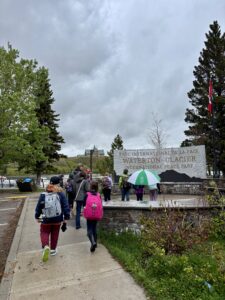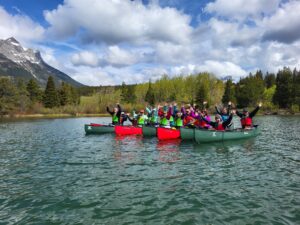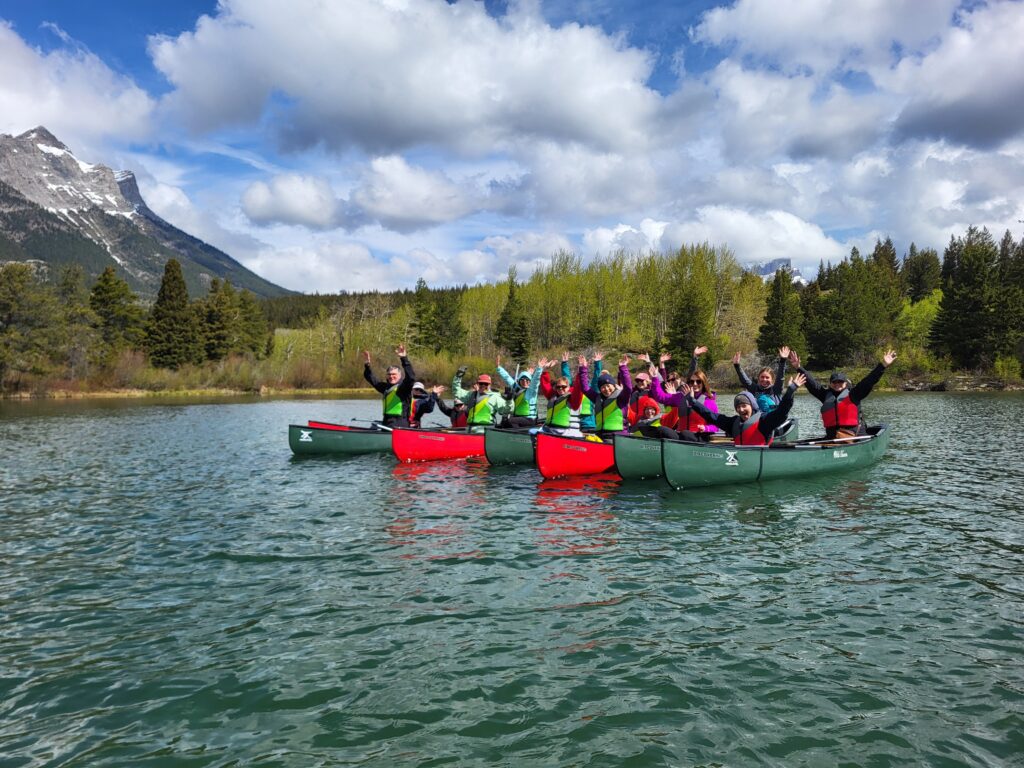Horace Allen and Isabelle Sellon Schools, located in Alberta’s Crowsnest Pass, wrapped up a three-year, grant-funded partnership with our Professional Learning Team this May. Since November 2022, teachers from both schools have been working alongside us to bring place-based education more deeply into their daily classroom practices.

Crowsnest teachers and our Professional Learning team coach all together after canoeing.
Place-based and land-based learning has long been a central focus at these schools. On any given day, students can be found learning outside—whether that’s skiing, exploring local national parks, or participating in immersive experiences at their division’s PEAKS campus (Place-based Experiences, Adventures, and Knowledge for Students). But while outdoor learning was thriving, the challenge was finding ways to tie place to classroom content, standards, and routines.
Through workshops, conferences, and sustained coaching, teachers embraced learner-centered approaches, inquiry, and project-based learning. This past year, their shared goal was for every K–6 classroom to design and carry out a student-led community impact project.
By October 2024, each teaching team had outlined detailed plans, including curricular goals, community partners, and strategies to center student voice and choice. While there were challenges along the way (as any good project has), every grade brought their plans to life, often with students leading the problem-solving.
Here’s a glimpse at the powerful work each grade level accomplished:
- Kindergarten & Grade 1 teamed up to improve their playground. After securing some initial donations, students raised an additional $600, purchased needed equipment, and hosted an assembly to teach peers how to use and care for it.
- Grade 2 took on a garden beautification project, applying math and science skills to improve their school garden and support its ongoing care.
- Grade 3 tackled playground enhancements too, using surveys, data analysis, and budgeting to plan upgrades like a painted 4-square court and mini-stick hockey nets, supported by donations from the community.
- Grade 4 led monthly student-driven mini-projects, from collecting food bank donations to raising money for the local animal shelter. They’re now dreaming big with a plan to create a more accessible playground for students in wheelchairs.
- Grade 5 launched a community podcast, where students researched, interviewed, and will soon publish episodes featuring “famous locals” from the Crowsnest area.
- Grade 6 focused on supporting the local hospital by designing products to sell at the June community market, blending entrepreneurship with civic engagement.
In our final two-day visit with the schools, we had the joy of joining Grade 4 students on a place-based learning experience in Waterton Lakes National Park. There, students explored art, ecology, and history through a place-triangle scavenger hunt and exhibits at the visitor center, with guidance from Parks Canada staff.

Students walking in front of the Waterton-Glacier International Peace Park Sign on their place-triangle scavenger hunt.
We closed out the visit—and the three-year partnership—with a celebration of learning. Teachers shared the incredible community impact projects they led with their students, and we capped things off with a canoe outing and hike, soaking in the beauty of the place that has shaped so much of this work.

Teachers celebrating in their canoes.
Looking ahead, Horace Allen and Isabelle Sellon teachers are energized. They’re proud of how far they’ve come and excited about what’s next. The culture of place-based learning is alive and growing—and we can’t wait to see what their students will do next.

